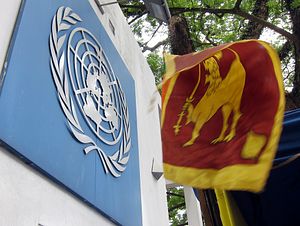A recently published article in The Diplomat looks at Sri Lanka’s progress pertaining to transitional justice and the commitments Colombo has made at the United Nations Human Rights Council (HRC), which recently concluded its 37th session in Geneva.
Unsurprisingly, the piece accurately notes that there is quite a bit that Colombo hasn’t achieved.
After all, the coalition government has never been serious about transitional justice; we know this because so little has happened over the past three years.
In that context, the last paragraph of the article caught my attention.
If Sri Lanka wants the international community to believe in its good intention, it must use the remaining period effectively and by 2019 implement the pledges made in the past. The government’s efforts must not aim to appease the international community but to fulfill its promise to its own minority that peace will be based on justice.
What “good intention” could the author possibly be referring to?
Suggesting that the government has good intentions on this issue is both woefully misguided and totally counterproductive.
Moreover, the idea that we might see peace “based on justice” flies in the face of the government’s actions and a range of public statements about justice and accountability.
Sri Lanka’s current engagement with the HRC is little more than a sideshow.
Giving Colombo a two-year extension (during the HRC’s 34th session) to attempt to address reforms that it has no intention of implementing has been exposed as an increasingly obvious mistake.
A one-year extension would have made more sense.
But really, any continuation of the existing charade remains nonsensical. Sri Lanka has been making a mockery of the HRC for some time. Let’s stop pretending that putting Sri Lanka under the HRC’s microscope matters.
At this juncture, we don’t need more time to ponder Colombo’s sincerity – or naively hope for meaningful reform – as it relates to transitional justice.
The notable lack of progress thus far reiterates that the crafting of a robust transitional justice agenda has always been about cosmetic maneuvering, placating international actors, and rehabilitating Sri Lanka’s sullied image on the international stage.
































